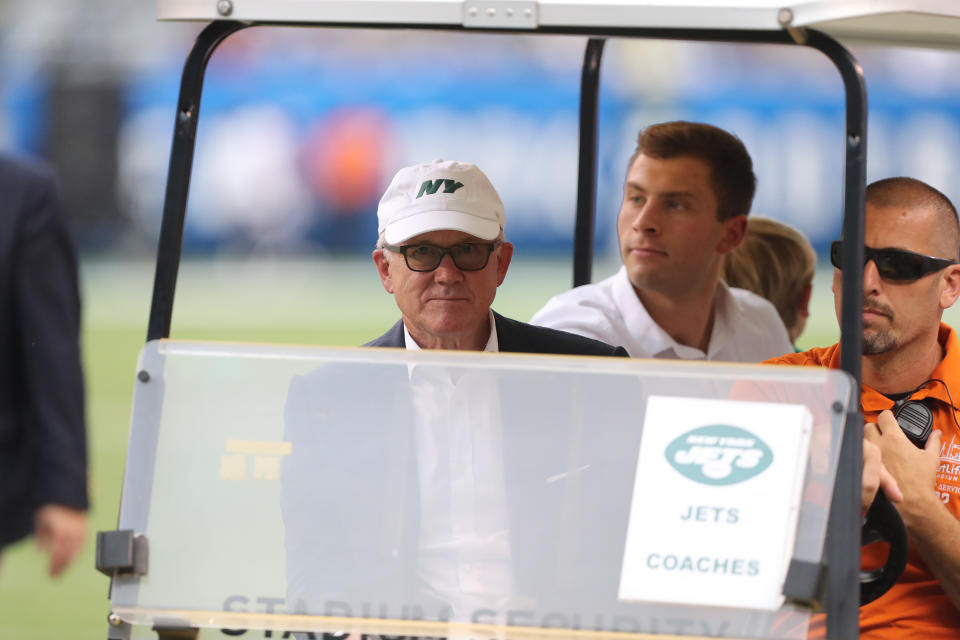NFL’s latest ownership controversy a stinging reminder of where the league is really lacking
Whoo boy, has it been a rough week for the New York Jets and team owner Robert Wood “Woody” Johnson.
On Tuesday, a New York Times story said President Donald Trump asked Johnson, his ambassador to the United Kingdom since 2017, to help steer the British Open to a Trump resort. As if that wasn’t enough, a day later CNN reported that the State Department investigated Johnson for allegedly making racist and sexist comments to staff.
Johnson denied the reports from his Twitter account.
“I have followed the ethical rules and requirements of my office at all times,” he said. “These false claims of insensitive remarks about race and gender are totally inconsistent with my longstanding record and values.”
I have followed the ethical rules and requirements of my office at all times. These false claims of insensitive remarks about race and gender are totally inconsistent with my longstanding record and values.
— Ambassador Johnson (@USAmbUK) July 22, 2020
CNN’s report cited sources that claimed Johnson’s comments about women’s looks were “cringeworthy” and that he made racist generalizations about Black men and questioned why the Black community celebrates Black History Month.
The totality of the reports, in which Johnson appears to show a lack of empathy for the problems minorities face in this country, was so troubling that the Fritz Pollard Alliance, an organization that fights to increase minority representation in the NFL, felt compelled to release a statement Thursday. Group chairman Harry Carson and executive Rod Graves said:
“The Fritz Pollard Alliance is deeply troubled by allegations of insensitive remarks about race and gender made by New York Jets owner Woody Johnson while serving abroad as a U.S. Ambassador. Allegations of this nature, if true, are damaging to the social fabric of our country and cannot be tolerated. While only allegations at this point, they are serious. We call on the NFL to carefully monitor this situation and, if the allegations have merit, to take appropriate action and work toward rooting out such sentiments from the NFL community.”
So, yeah. As Pete Campbell from “Mad Men” might say ... not great, Bob! Especially since Johnson is a member of the NFL ownership spectrum, which overwhelmingly skews older, rich, male and white.

The news is particularly disappointing, too, since Jets ownership has appeared to be a touch more understanding of Black activism than their brethren across the league. When the NFL approved a policy in the summer of 2018 that mandated players stand for the national anthem, Johnson’s brother Chris, who is acting as team owner while Woody fulfilled his role in the Trump administration, voted for the change, citing an obligation “to support it from a membership standpoint,” but volunteered to pay for his players’ fines and said there would be no suspensions or repercussions for kneeling. The NFL froze the policy weeks later.
Yet, the latest allegations undercut whatever goodwill Jets ownership received in the aftermath of that. Star safety Jamal Adams even ripped the Jets owner on Twitter, noting that “We need the RIGHT people at the top. Wrong is wrong,” later adding “if u don’t think this is wrong you’re part of the problem not the solution.”
Granted, Adams is agitated by the lack of movement on the long-term contract he was promised this offseason. But his comments are still interesting because, during a rough week for Jets ownership, Adams’ version of events also suggest a lack of integrity at the highest levels of the organization. And coming from one of the youngest team captains in the NFL, that’s no small charge. It’s much easier to lead from the front when someone has moral authority, which causes people to follow because they are inspired by them, not because they simply own the team they play on.
Unfortunately, we’ve been reminded far too often of late that NFL team ownership often finds itself in commanding positions for the latter reason and not the former, with Dan Snyder’s complete absence of leadership in Washington being a perfect example of this, in addition to late Texans owner Bob McNair’s incredibly offensive “inmates” comment in 2017.
And every single time one of these team owners reportedly do or say something offensive — or allow them to happen in their organization — players are never shy about speaking out about it, their frustration compounded by the incomprehensible fact that in a league that’s 70 percent Black, there are only two owners of color in the NFL, neither of whom are Black.
The fact there’s never been a Black NFL team owner also sticks out like a sore thumb, just as much as the lack of Black faces in leadership positions across the lower levels of all 32 organizations.
In response to this, many Black players, assistant coaches and scouts have long exhorted the need for team owners to change their hearts if they want to fix the league’s diversity problem.
The allegations against Johnson, regardless of the results of the State Department’s investigation, offer proof of why.
More from Yahoo Sports:

 Yahoo Lifestyle
Yahoo Lifestyle 